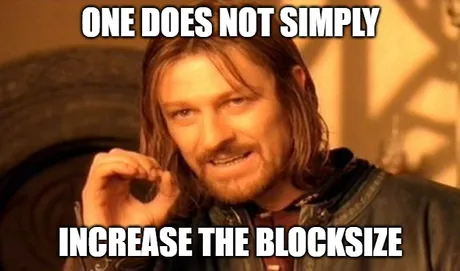
Size matters.
Especially when that size is in reference to the size and frequency of the blocks on-chain. For example, Hive has very tiny blocks (current max size 65KB). Heh, seriously look at that "post". I filled up an entire block with "0123456789" until I reached the max limit of ~65k one byte characters. One day people will look back and be like, "Wow, this @edicted guy filled up a block just because he could? That's crazy." If you tried to do something like that on Bitcoin it would cost like $40k. Blockchains are weird and inefficient. Bandwidth is precious.

So why am I glad that Bitcoin didn't increase blocksize?
This is an extremely contentious issue. The debate about whether Bitcoin's blocksize should be increased has been argued in a thousand different ways and even spawned multiple conspiracy theories. For example, some people would tell you that Blockstream controls Bitcoin code updates and keeps the blocksize low to centralize the network so that it can more easily be controlled by centralized exchanges and Lightning Network operators.
Blockstream and much of the Bitcoin community would claim that they want a very low blocksize to increase decentralization of nodes. If running a node takes very little resources, many people all around the world will be able to run one on the cheap. That's a good thing, but is it worth it? Many would say that it's not. After all, computers are at least ten times faster now than when Bitcoin was invented. Shouldn't we be increasing the blocksize if not only to "keep up with inflation"? There is certainly merit to both sides of the debate.

But I am definitively warming up to the idea.
Why is this? Because the Bitcoin network hasn't even come close to unlocking its full potential. This has become painfully obvious to me during my research. For example, the Bitcoin network is creating an unhackable random-number seed every ten minutes on average after minting every single block.
Unhackable RNG.
Imagine someone created a lottery using the Bitcoin block hashes as the seed for random number generation. Let's say the prize for winning this lottery was one million dollars. You'd think that with a one million dollar prize pool it would be worth it to cheat, but mathematically this is simply just not the case.
First of all, cheating is only an option for users who control a massive amount of hash power, meaning they have to control one of the top ten mining pools (also they have to risk their reputation and their delegations in the process if they get caught). Already this is a tiny tiny subset of people compared to the world's population. Already we are on thin ice, but let's keep going.
So this person controls a metric ton of Bitcoin hashpower. How are they going to cheat at the lottery and win one million dollars? Well, that's easy... all they have to do is mine Bitcoin blocks and throw away valid blocks that don't win the lottery. Already we can see that this is an impossible scenario.
Every Bitcoin block has a reward of 6.25 BTC plus all the transaction fees of that block. At these prices, they'd have to discard $200k in block rewards for every single block they needed to throw away before they won.
Let's say tickets cost $1 and each one has a one in a million chance of winning. Even if they bought 1000 tickets they'd still have to throw away 1000 Bitcoin blocks in a row on average (two hundred million dollars) in order to win the one million dollars. And this all assumes that a single mining pool could mine 1000 blocks in a row before another mining entity found the next block and beats them to the punch. It's simply not possible, and if it was possible it certainly isn't profitable.
We can see by this math that it's safe to run even the biggest prize pools a lottery has to offer. The payout could be hundreds of millions of dollars and the chance/profitability of hacking the outcome would still be lower than the chance of cheating lotteries that don't use Bitcoin for security (all of them).

Another example (the real example):
Say someone makes an MMORPG and piggybacks off of Bitcoin for the same reason (superior RNG security). Say the game uses Bitcoin blocks when anyone wants to craft a super rare item with super rare materials and they need to make sure it's impossible to cheat.

Congrats, you just randomed the Sword of a Thousand Truthes
On a technical level, what needs to happen here? Well, if the game is decentralized (we hope so) then multiple nodes are all running the same code. Maybe the game runs on Hive, meaning these nodes need access to a Hive node they can trust. Maybe the game runs on a Hive second layer, meaning they might have to run that second layer code as well. And finally, maybe these nodes also need access to the Bitcoin blockchain as well.
Wow, that's a lot of overhead.
Certainly, there are ways around these things and corners that can be cut. We might not have to run a Hive node; we could trust one of the many trustworthy Hive nodes out there (or redundantly confirm across multiple nodes). We might not NEED our own Bitcoin node, but wouldn't it be nice to have one? Surely it's harder to hack a network that has direct and trustworthy access to the data they are using.
This is why I like the small blocksize on Bitcoin.
Because I believe that Bitcoin nodes will start being a requirement for other networks that use Bitcoin security in unintended ways like this. If running a Bitcoin node was expensive, upkeep on one of these hybrid platforms would be really really expensive. Luckily, this isn't something we have to worry about, as the Bitcoin network is going to just keep chugging along like it has been all these years. The unchanging nature of Bitcoin code is a feature, not a bug.
Conclusion
Secure random number generation is one of the hardest things to do when it comes to blockchain gaming. Luckily, for certain functions (ones that can wait 10-20 minutes in between batches) Bitcoin has already solved this problem... and no one is taking advantage of this epic solution. It's wild. Truly, we are on the cutting edge of crypto. It's still very early in the game.
Not only that, but it's only going to get better. Bitcoin will continue going up in price. Hash power will continue to rise, and the security of the Bitcoin network is going to reach godlike levels of adoption. Most people don't realize this, but it's a great thing that Bitcoin nodes are so cheap to run. The most secure network is also going to be the least expensive to track. That's powerful.
I underestimated Bitcoin in 2017.
I don't plan on making that mistake again.
Posted Using LeoFinance Beta
Return from Hybrid Nodes: Why I'm Glad Bitcoin Cash Lost the Hash War. to edicted's Web3 Blog
